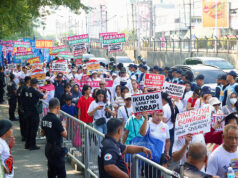PAL to take delivery of Airbus 350-900 in the coming weeks
PHILIPPINE Airlines (PAL) could expect the delivery of its A350-900 aircraft soon as Airbus reported it has successfully flown the new airplane from the assembly line in Toulouse, France, gearing it up for the final phase of production.
“The flight marks the start of the final phase of the production process, leading to customer acceptance and delivery in the coming weeks,” Airbus said in a statement.
The local airline ordered six A350-900s from the European aerospace company’s A350 XWB series, and earlier said it was expecting the delivery of the first unit by July. The other type of aircraft in the A350 XWB family is the A350-1000.
“We ordered six Airbus 350. Four will be delivered this year, and two will be delivered next year. And then we have the option for another six, and that option can be converted into (Airbus) 350-1000,” PAL President Jaime J. Bautista told reporters last week.
PAL’s current fleet consists of 26 A320s, 15 A330s and five 340s, Airbus said. The new planes will be used for premier long haul flights that connect Manila to North America and Europe.
Mr. Bautista earlier said the A350-900 will replace their existing A340 units which has a smaller capacity.
“We’re taking delivery of four Airbus 350, but we are retiring also our Airbus 340. But there’s more seats on the 350. From 254 to 295. So that’s an additional 41 seats,” he said, noting there will be a 20% increase in capacity.
The acquisition of the new aircraft is also expected to help in the company’s fuel conservation program by reducing fuel costs by within 20% per seat kilometer basis, Mr. Bautista said.
“The A350 XWB features the latest aerodynamic design, carbon fiber fuselage and wings, plus new fuel-efficient Rolls-Royce engines. Together, these latest technologies translate into unrivaled levels of operational efficiency, with a 25% reduction in fuel burn and emissions, and significantly lower maintenance costs,” Airbus noted in the statement.
PAL is currently seeking the approval of a higher fuel surcharge from the Civil Aeronautics Board (CAB) because of the rising prices of jet fuel, which increased by $13 from January to April. It said the company consumes 11 million barrels of fuel a year, which would cost them an additional $143 million if their application is dismissed.
The company’s order for A350-900 and its separate order for Airbus 321 NEO planes are some of its contingency measures to handle the fuel problem as the two aircraft are more fuel-efficient.
PAL Holdings, Inc., the listed operator of PAL, saw its net loss sink deeper in the first quarter at P1.1 billion, largely due to the fuel cost issue. In a regulatory filing, the company reported its expenses were driven by spending for fuel and oil, which stood at P11.746 billion, P2.1 billion higher than in the same period last year. — Denise A. Valdez



